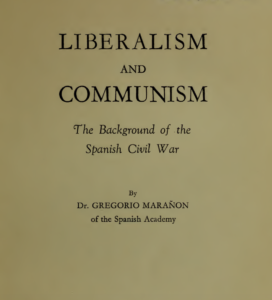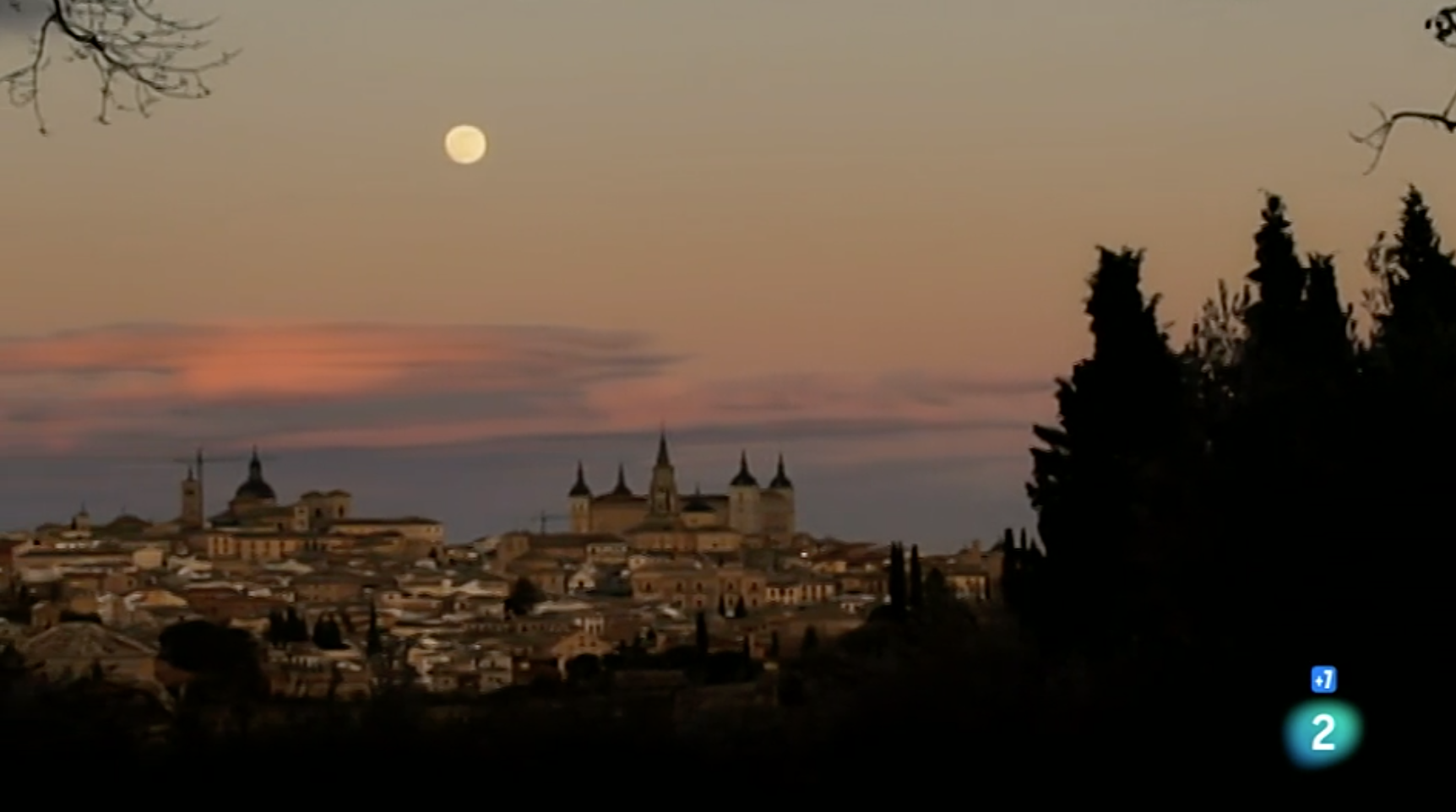Dr. Gregorio Marañón (1887-1960) author of this remarkable article, was a member of the Spanish Academy. Physician, biologist and essayist, he collaborated with Ortega y Gasset and Pérez de Ayala in forming a republican association, which was spreading in Spain a year before the fall of the monarchy. Dr. Marañón’s republicanism, therefore, stands in no need of proof and this gives an added significance to the article in which the author explains why most of the Spanish Liberals were hostile to the Republican Government in 1937.
His article ‘Liberalism and Communism’ has the subtitle ‘The Background of the Spanish Civil War’ but it is much more than that. It was written in Paris for the Revue de Paris, first published on 15 December 1937. It also appeared in the Argentine newspaper La Nación (3 January 1938). Final version was published in Punta Europa magazine, n. 55-56, Madrid, 1960.
Dr. Marañón, on spite of his support to the Spanish republican government, had to exile from Madrid in the middle of the civil war.

Link to the Spanish version Liberalismo y Comunismo (1937)
From his book Liberal Essays, 1947:
Being a liberal is precisely these two things: first, being willing to get along with someone who thinks otherwise; and second, never admit that the end justifies the means but, on the contrary, it is the means that justify the end. Liberalism is, then, a conduct and, therefore, much more than a policy. And, as such behavior, it does not require professions of faith but to exercise it, in a natural way, without exhibiting it or showing it off. One must be liberal without realizing it, how one is clean, or how, instinctively, we resist lying
Some of the key ideas from Dr. Marañón in this article:
“The Spanish liberal […] had underneath his liberalism an attitude which was profoundly anti-liberal, for the simple reason that it was tinted red.” (p. 6)
“[…] the fact that the Right parties won the elections was made the pretext for a revolutionary bid for power in October, 1934. This is forgotten abroad where there is no special reason to remember the details even of recent Spanish history. Spaniards, who have not forgotten are amused at the puritanical horror of those who were prepared to make a revolution against perfectly legal elections, but who are shocked because a section of the people and the army rose in turn against the violences of the new power, such as the murder of the Leader of the Opposition by three police officers.” (p. 10)
“The characteristic of this Liberal—the false and far the most numerous type—is his infinite fear of not appearing Liberal. […] The immense social prestige of Liberalism explains and is felt to justify this attitude. […] According to current ideas, not to be a Liberal is to be deficient in intelligence, for, as a matter of fact, a large number of men famous for their creative work were Liberals or at least had minds tinctured with Liberal toleration. Not to be Liberal signifies moreover to be “an enemy of the people,” a phrase created by the French Revolution, which still maintains all its prestige in many minds. And that means, too, not to be modern, because many conquests of civilization have been made under the banner of Liberty. But Liberty has no fixed colour. It is not a question of ideas but of conduct. What a terrible mistake to have turned it not only into a question of politics but into one of class politics!” (p.15)
“The necessity of taking account of regional characteristics in Spain has always seemed to me to be biological rather than political. Having said this I must point out that the error which has been made is to confuse the noble reality of regionalism with separatism. The national sentiment of
Spain is made up of a regional spirit which is, in its turn, an extension of the Spanish family sense. That sense, so far from being enfeebled, provides regionalism with its sap and vigour. In any village in America, no less than in Madrid or in Barcelona, Spaniards meet as representatives of provinces in their regional centres like large families which hardly rub shoulders with others. But faced with the nation in danger they all unite, animated by the same zeal and perhaps the common peril will result in creating a sort of union.” (p. 18)
“Two months before the Spanish Revolution began, I wrote in an article which appeared in several European and American newspapers that if the Spanish Popular Front, which had just been formed, failed to give to its ideology and to its action a profoundly national direction, it would provoke a rising in Spain. There was no particular merit in this prediction, for
on all hands one could observe the hostility of Spaniards in face of the notoriously Russian tactics of the pre-Revolutionary agitations, which were never sanctioned by our governments. The most important fact bearing on this, which nobody noted, was the attitude of the young people at the Universities who supplied the force of the Liberal shock movement against the dictatorship and the leaven of the agitation which paved the way for a change of regime. From the third year of the Republic it began to change its orientation […] Today 80 per cent, of the students are fighting as volunteers in the Nationalist ranks. Many of them were brought up in a Liberal environment and belonged at the outset of their studies to Liberal and even Socialist and Communist Students’ organisations. There are many young people, then almost children, whom we knew in prison during the dictatorship, who are today heroes, living or dead, of the anti-Marxist cause. What has changed them is undoubtedly the anti-Spanish character of the Popular Front propaganda.” (p. 19 -20)
The following RTVE documentary “Gregorio Marañón. Doctor, humanist and liberal” (in Spanish) was produced in 2010 by the State Society for Cultural Commemorations on the occasion of the 50th anniversary of his death. An occasion to get closer to a key man of our time. An eminent physician, brilliant writer, and illustrious intellectual.
